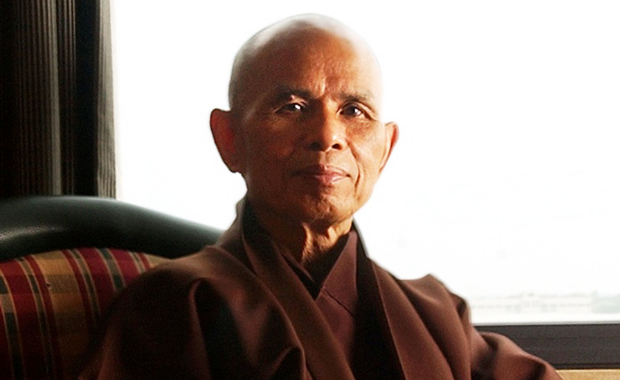Life
The Most Powerful Lessons Thich Nhat Hanh Taught Us

Thich Nhat Hanh was one of the most influential spiritual leaders on the planet. Revered for promoting peace and bringing mindfulness to the west. Even Dr Martin Luther King, Jr. called him “an apostle of peace and nonviolence”.
It’s no wonder then that there are mourners the world over after the recent passing of Thich Nhat Hanh.
Solace does come through the powerful lessons he leaves behind.
Live in the here and now
Living presently has become a buzzword of sorts in recent years. We all know we ought to live that way, but few of us truly understand mindfulness, let alone are able to cultivate it.
Hanh’s gentle approach to mindfulness reminds us that peace is always available.
As he said, “feelings come and go like clouds in a windy sky. Conscious breathing is my anchor.”
By thinking of our feelings, and our thoughts as passing clouds, we see them differently. We no longer have to believe every thought, nor allow ourselves to fall into the trap of obsessive thinking. Instead, we gain power and perspective when we separate ourselves from our feelings and let them come and go.
Let go of suffering: start living
To really live mindfully, Thich Nhat Hanh said that we must let go of our suffering. Unfortunately, many of us would prefer to continue suffering than to step into the unknown.
And Hanh knew a thing or two about suffering. After travelling from his home country Vietnam to the U.S. and Europe to oppose war, (something that led him to be nominated for Nobel Peace Prize) Hanh was exiled from Vietnam for 39 years. Instead of making him bitter, he remained peaceful and continued his work around the globe.
“People have a hard time letting go of their suffering,” said Hanh, “Out of a fear of the unknown, they prefer suffering that is familiar.”
Our worries, anxieties, fears and regrets might feel familiar – and therefore safe – but to free ourselves and live in the present moment, we must let them go.
It means being strong with ourselves. When negative thoughts arise, we must allow them to float away. And gently come back to the present moment.
Enjoy every day
In our current world of restrictions, case numbers, and variants, naturally, fears and anxieties arise. Enjoying every day might seem hard in time’s like these. Regardless, Hanh is adamant that we ought to enjoy not just every day, but every minute too.
“I promise myself that I will enjoy every minute of the day that is given me to live,” he said.
It’s worth remembering, our days are not guaranteed. Importantly, happiness is actually a choice we make each day. There is incredible power in knowing this. Just as we can let out thoughts pass by us, we can choose to enjoy every day regardless of our circumstances.
Silence is powerful
Our world is noisy. If we aren’t obsessively scrolling on our phones, we’re replying to emails, taking calls or streaming drama shows. Notifications come in from multiple sources every hour of every day. Switching off is something that gets increasingly difficult. Yet, silence may just be the key to improving our lives.
Hanh believed so strongly in the power of silence he authored a book on it – one that had a lasting impact on my life.
“Silence is essential,” he said. “We need silence just as much as we need air, just as much as plants need light. If our minds are crowded with words and thoughts, there is no space for us.”
Practising silence allows us to hear our inner world. Rather than distracting ourselves with continuous noise, silence has the power to give us inner peace, knowledge, and knowing.
It can power our decision making, improve our focus, and perhaps even had a positive impact on our mental health. And according to Hanh, because silence comes from within, we can cultivate silence even in the most chaotic of places.
Come back to your breath
If you know anything about mindfulness, you’ll have undoubtedly heard about coming back to your breath. But for Hanh, it was so much more than a meditation technique. Connecting with our breath is a way of life and an anchor for us to truly live in the present moment.
“Breath is the bridge which connects life to consciousness, which unites your body to your thoughts. Whenever your mind becomes scattered, use your breath as the means to take hold of your mind again,” he said.
It’s uncommon for most of us to even consider our breath on a daily basis, let alone use it as a way to calm our minds. Yet focussing on our breathing for just a few minutes can do wonders for relaxation, and mental clarity.
There is comfort in passing
Having now passed, Thich Nhat Hanh’s view of death feels more relevant than ever. In one of his books, No Death, No Fear he details that when his mother passed away he suffered for a year. Then, one evening, after having an intense dream about his mother, he decided to go outside and walk in the moonlight. As he walked he realised she had never truly left him – that was a concept his mind had created.
“From that moment on, the idea that I had lost my mother no longer existed. All I had to do was… feel the breeze on my face or the earth under my feet to remember that my mother is always with me, available at any time.”
In a world that fears death, Hanh’s thoughts are comforting. Perhaps one of the greatest teachers of mindfulness and peace hasn’t left us at all.
Did You Know
How Skilled Migrants Are Building Successful Careers After Moving Countries
Behind every successful skilled migrant career is a mix of resilience, strategy, and navigating systems built for locals.

Moving to a new country for work is exciting, but it can also be unnerving. Skilled migrants leave behind familiar systems, networks, and support to pursue better job opportunities and a better future for their families. (more…)
Life
10 Research-Backed Steps to Create Real Change This New Year
This New Year could finally be the one where you break old patterns and create real, lasting change.

Every New Year, we make plans and set goals, but often repeat old patterns. (more…)
Life
9 Harsh Truths Every Young Man Must Face to Succeed in the Modern World
Before chasing success, every young man needs to face these 9 brutal realities shaping masculinity in the modern world.

Many young men today quietly battle depression, loneliness, and a sense of confusion about who they’re meant to be.
Some blame the lack of deep friendships or romantic relationships. Others feel lost in a digital world that often labels traditional masculinity as “toxic.”
But the truth is this: becoming a man in the modern age takes more than just surviving. It takes resilience, direction, and a willingness to grow even when no one’s watching.
Success doesn’t arrive by accident or luck. It’s built on discipline, sacrifice, and consistency.
Here are 9 harsh truths every young man should know if he wants to thrive, not just survive, in the digital age.
1. Never Use Your Illness as an Excuse
As Dr. Jordan B. Peterson often says, successful people don’t complain; they act.
Your illness, hardship, or struggle shouldn’t define your limits; it should define your motivation. Rest when you must, but always get back up and keep building your dreams. Motivation doesn’t appear magically. It comes after you take action.
Here are five key lessons I’ve learned from Dr. Peterson:
-
Learn to write clearly; clarity of thought makes you dangerous.
-
Read quality literature in your free time.
-
Nurture a strong relationship with your family.
-
Share your ideas publicly; your voice matters.
-
Become a “monster”, powerful, but disciplined enough to control it.
The best leaders and thinkers are grounded. They welcome criticism, adapt quickly, and keep moving forward no matter what.
2. You Can’t Please Everyone And That’s Okay
You don’t need a crowd of people to feel fulfilled. You need a few friends who genuinely accept you for who you are.
If your circle doesn’t bring out your best, it’s okay to walk away. Solitude can be a powerful teacher. It gives you space to understand what you truly want from life. Remember, successful men aren’t people-pleasers; they’re purpose-driven.
3. You Can Control the Process, Not the Outcome
Especially in creative work, writing, business, or content creation, you control effort, not results.
You might publish two articles a day, but you can’t dictate which one will go viral. Focus on mastery, not metrics. Many great writers toiled for years in obscurity before anyone noticed them. Rejection, criticism, and indifference are all part of the path.
The best creators focus on storytelling, not applause.
4. Rejection Is Never Personal
Rejection doesn’t mean you’re unworthy. It simply means your offer, idea, or timing didn’t align.
Every successful person has faced rejection repeatedly. What separates them is persistence and perspective. They see rejection as feedback, not failure. The faster you learn that truth, the faster you’ll grow.
5. Women Value Comfort and Security
Understanding women requires maturity and empathy.
Through books, lectures, and personal growth, I’ve learned that most women desire a man who is grounded, intelligent, confident, emotionally stable, and consistent. Some want humor, others intellect, but nearly all want to feel safe and supported.
Instead of chasing attention, work on self-improvement. Build competence and confidence, and the rest will follow naturally.
6. There’s No Such Thing as Failure, Only Lessons
A powerful lesson from Neuro-Linguistic Programming: failure only exists when you stop trying.
Every mistake brings data. Every setback builds wisdom. The most successful men aren’t fearless. They’ve simply learned to act despite fear.
Be proud of your scars. They’re proof you were brave enough to try.
7. Public Speaking Is an Art Form
Public speaking is one of the most valuable and underrated skills a man can master.
It’s not about perfection; it’s about connection. The best speakers tell stories, inspire confidence, and make people feel seen. They research deeply, speak honestly, and practice relentlessly.
If you can speak well, you can lead, sell, teach, and inspire. Start small, practice at work, in class, or even in front of a mirror, and watch your confidence skyrocket.
8. Teaching Is Leadership in Disguise
Great teachers are not just knowledgeable. They’re brave, compassionate, and disciplined.
Teaching forces you to articulate what you know, and in doing so, you master it at a deeper level. Whether you’re mentoring a peer, leading a team, or sharing insights online, teaching refines your purpose.
Lifelong learners become lifelong leaders.
9. Study Human Nature to Achieve Your Dreams
One of the toughest lessons to accept: most people are self-interested.
That’s not cynicism, it’s human nature. Understanding this helps you navigate relationships, business, and communication more effectively.
Everyone has a darker side, but successful people learn to channel theirs productively into discipline, creativity, and drive.
Psychology isn’t just theory; it’s a toolkit. Learn how people think, act, and decide, and you’ll know how to lead them, influence them, and even understand yourself better.
Final Thoughts
The digital age offers endless opportunities, but only to those who are willing to take responsibility, confront discomfort, and keep improving.
Becoming a man today means embracing the hard truths most avoid.
Because at the end of the day, success isn’t about luck. It’s about who you become when life tests you the most.
Change Your Mindset
The Four Types of Happiness: Which One Are You Living In?
Most people chase success only to find emptiness, this model reveals why true happiness lies somewhere else.

In a world driven by rapid technological growth and constant competition, many people unknowingly trade joy for achievement. (more…)
-

 News4 weeks ago
News4 weeks agoBrandon Willington Builds 7-Figure Business by Ignoring Almost Everything
-

 Did You Know4 weeks ago
Did You Know4 weeks agoWhy Most Online Courses Fail and How to Fix Them
-

 Business4 weeks ago
Business4 weeks agoIf Your Business Internet Keeps Letting You Down, Read This
-

 Business3 weeks ago
Business3 weeks agoEntrepreneur’s Guide to Pay Stubs: Why Freelancers and Small Business Owners Need a Smart Generator
-

 Business2 weeks ago
Business2 weeks agoThe Salary Shift Giving UK Employers An Unexpected Edge
-

 Scale Your Business2 weeks ago
Scale Your Business2 weeks ago5 Real Ways to Grow Your User Base Fast
-

 Business2 weeks ago
Business2 weeks agoThe Simple Security Stack Every Online Business Needs
-

 Finances3 weeks ago
Finances3 weeks agoWhy Financial Stress Is One of the Biggest Barriers to Personal Growth




























